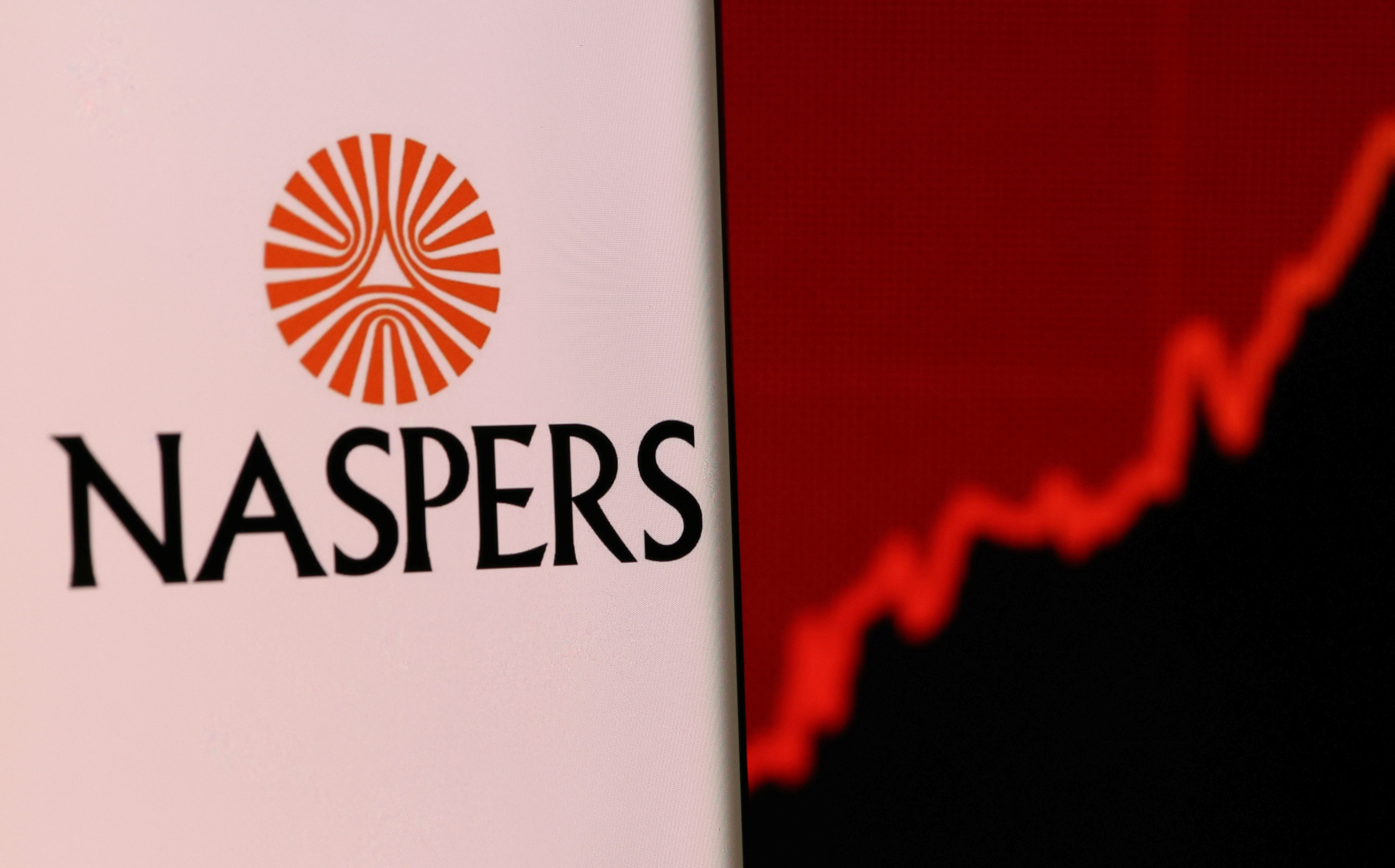
Naspers’ logo is pictured on a smartphone in front of a stock graph displayed in this illustration taken December 4, 2021. REUTERS/Dado Ruvic/Illustration
LONDON, June 27 (Reuters Breakingviews) - Naspers (NPNJn.J) has finally realised the value of simplicity. The South African company’s main asset is a 29% shareholding in Chinese internet giant Tencent (0700.HK), currently worth $133 billion. But Naspers has consistently traded at a big discount to that stake, while tying itself in increasingly complicated knots to close the gap. A pledge on Monday to slowly sell some Tencent stock and return the cash to shareholders has the merits of being both intelligible and reassuring.
The 16% bump in Naspers’ Johannesburg-listed shares on Monday morning will come as a relief to Chief Executive Bob van Dijk. To date, the Dutchman’s efforts to narrow the gap between Naspers’ market value and that of its underlying assets have mainly benefitted lawyers and corporate financiers rather than shareholders. Despite spinning off an Amsterdam-listed subsidiary, Prosus (PRX.AS), in 2019, the gap has sometimes widened to 60% or more.
The latest plan helps in two ways. First, the open-ended scheme to sell Tencent shares in the market and use the proceeds to buy back Naspers and Prosus stock effectively creates a put option for investors.
Second, van Dijk is sending a clear signal that the company’s Tencent riches will be returned to shareholders, not frittered away on some high-risk internet startup. That was more than a theoretical risk: Prosus recently wrote off its 28% holding in VKontakte, Russia’s equivalent of Facebook.
The latest move does nothing to address other factors weighing on Naspers’ valuation. The company’s clunky governance structure, in particular the super-voting shares that kick in as soon as either it or Prosus looks remotely vulnerable to a takeover, stay in place. Naspers also remains vulnerable to South Africa’s currency swings and faces a liability for capital gains tax on its Tencent investment.
The company will remain a big Tencent shareholder for a long time. To avoid weighing on the Chinese company’s share price, Naspers and Prosus say they will only sell up to 5% of the average daily trading turnover, at most about 1 million shares a day. At that rate, it would take until 2033 to dispose of all the shares. And by keeping his wording vague – the buybacks will last as long as the discount remains “elevated” – van Dijk has scope to slow the pace if the gap narrows as planned. There’s beauty in simplicity after all.
Follow @edwardcropley on Twitter
CONTEXT NEWS
South Africa’s Naspers and Amsterdam-listed Prosus on June 27 announced an open-ended programme to buy back their shares, funded by the gradual sale of their holding in Chinese internet giant Tencent.
Prosus, which is 73%-owned by Naspers, holds a 28.9% stake in Tencent. Historically, Naspers and Prosus have traded at a significant discount to the value of the Tencent holding.
The pair said sales of Tencent stock were unlikely to amount to more than 3%-5% of the average daily trading volume in the Chinese company’s shares. The programme would remain in place as long as the discount was at “elevated levels”.
Separately, the two companies said they had raised $3.7 billion from the sale of their holding in Chinese e-commerce firm JD.com.
Prosus shares were up 10.4% at 58.62 euros by 0715 GMT on June 27. In Johannesburg, Naspers stock was up 13% at 2,165 rand. Tencent shares closed down 1.6% at 378.2 Hong Kong dollars.